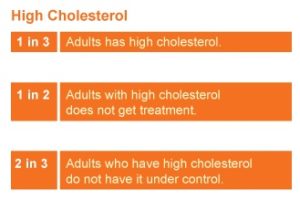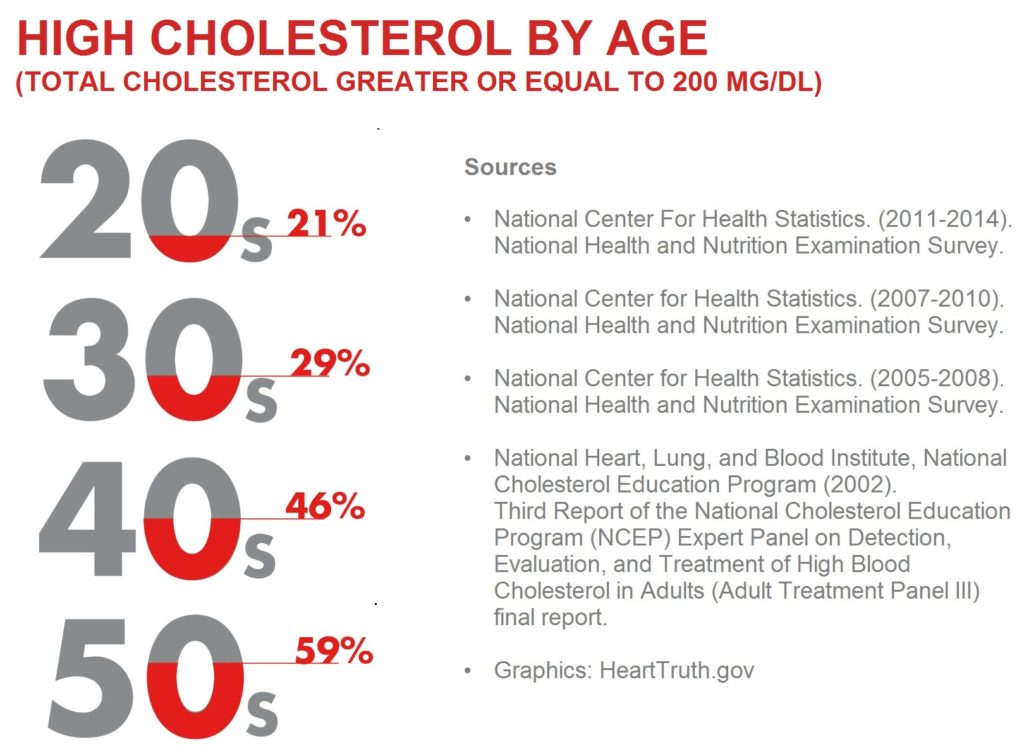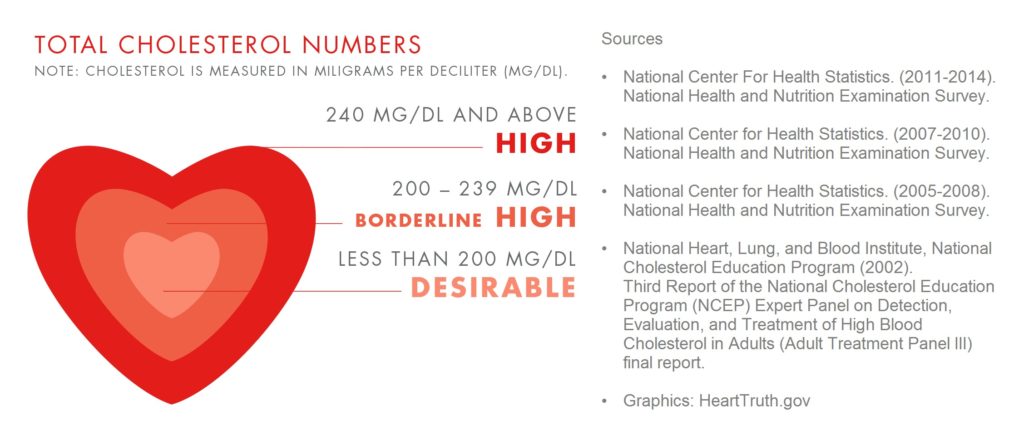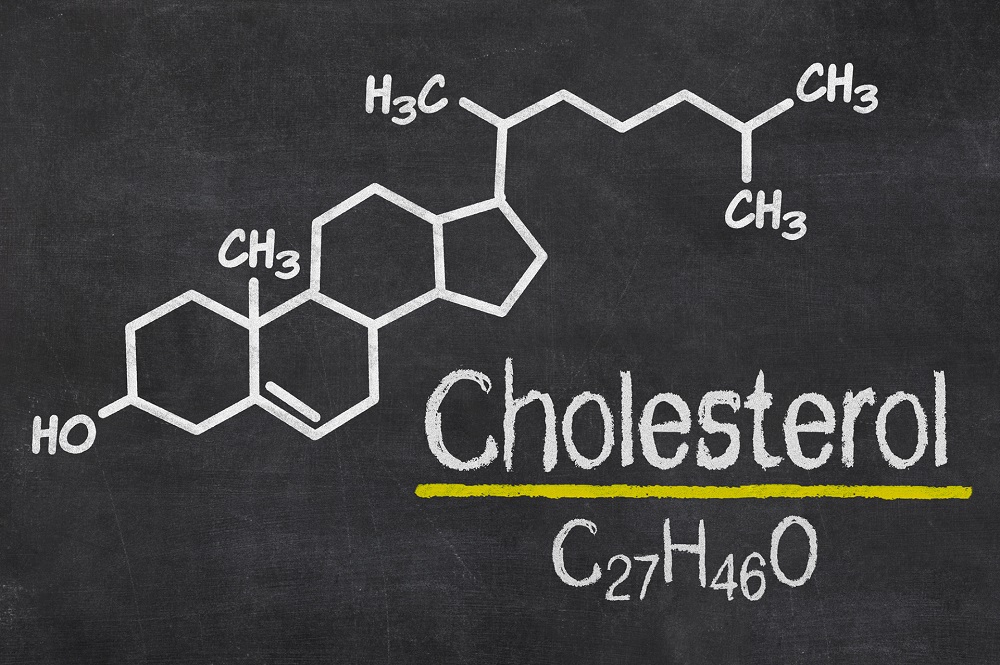What Everybody Ought to Know About Cholesterol
Summary: Health organizations recommend keeping high cholesterol levels in check to be healthier. [Author: Brady Hartman – This article first appeared on the website LongevityFacts.]
High cholesterol levels are a silent killer that significantly increases the risk of stroke, kidney disease heart attack, and death. Cholesterol builds up the insides of artery walls, blocking the arteries that feed the brain, heart, kidneys. Treatment is efficient and inexpensive, yet many people walk around with high cholesterol levels, needlessly letting it steal years from their lives.
Article Takeaways
- Lowering high cholesterol levels reduces the risk of heart disease.
- Cholesterol levels naturally rise with age.
- 1 in 3 adults has high cholesterol levels. Half of them don’t get treatment.
- Cholesterol can be lowered under a doctor’s care with medication, a healthy diet, lifestyle modifications or a combination of the three.
- That which is measured is improved – get your cholesterol checked often.
One of the keys to a long life is keeping high cholesterol levels in check. Here’s how and why.
Why Worry About High Cholesterol Levels?

According to the CDC, about one in three adults have high cholesterol levels. Sadly, half of them don’t get treatment. Of those that get treatment, shockingly, two-thirds of them don’t have their cholesterol under control. Putting the numbers together, of those adults with high cholesterol, only 1 in 6 keep their levels under control.
What Is Cholesterol?
Cholesterol is a fat-like substance that’s found naturally in the blood of all animals. Also known as a lipid, cholesterol as a lipid and is vital for the normal functioning of the body. The body uses it as a raw ingredient in other processes, such as making hormones. The human body manufactures all the cholesterol it needs. You can also get cholesterol by eating foods like egg yolks, fatty meats, and cheese. Eating an excess of these foods contributes to high cholesterol, increasing a person’s risk of developing heart disease. Having an excessively high cholesterol levels, a condition known as hyperlipidemia can harm your health. Cholesterol can be measured with a simple blood test.
There are two main types of cholesterol:
- LDL (low-density lipoprotein) – LDL is called bad cholesterol because an overabundance of it in the blood causes it to deposit onto arterial walls. Plaque builds up over time and eventually blocks the arteries. A high LDL cholesterol level is a known risk factor for heart attack and other chronic diseases.
- HDL (high-density lipoprotein) – HDL cholesterol is called good cholesterol because it helps clear the bad cholesterol out of the arteries. HDL carries bad cholesterol away from the cells and back to the liver. Higher levels of HDL are better.
What’s the Link Between High Cholesterol Levels and Plaque?
High cholesterol levels lead to a build of plaque on the artery walls, known as atherosclerosis. Also known as hardening of the arteries, atherosclerosis is a disease in which plaque builds up on the inner walls of the arteries. Plaque is made up of cholesterol, fat, calcium, and other substances. Over time, the plaque hardens and narrows the arteries, limiting the flow of oxygen-rich blood to the organs, especially the heart and brain.
Why is Atherosclerosis Harmful?
Atherosclerosis typically affects the medium and large arteries but can affect any artery, including arteries in the arms, legs, pelvis, kidneys. As a result, different diseases may develop based on which arteries are affected. The brain and heart are the most important organs affected by atherosclerosis, which increases the risk of heart attack, stroke, and death.
Why Are High Cholesterol Levels Dangerous?
Over an extended period, high cholesterol levels lead to a build-up of plaque inside the blood vessels that block blood flow the major organs, such as the heart and brain. It also increases the risk of a clot. The build-up of plaque in the arteries causes atherosclerosis which can lead to heart attack, stroke, or even death.
This article is intended to educate people about the dangers of high cholesterol levels in general, and not about the diseases it causes. The National Heart, Lung and Blood Institute (NHLBI), provides more information about the various diseases, as shown in the links below.
High Cholesterol Levels Increase the Risk of:
- Atherosclerosis is a narrowing of the arteries. This condition leads to the other diseases on this list.
- Coronary Artery Disease (CAD) / Coronary Heart Disease (CHD) – The coronary arteries supply blood to the heart. Blocking the coronary arteries leads to heart attack. The AHA has a good write-up on this topic.
- Carotid Artery Disease – The carotid arteries supply blood to the brain. Blocking these arteries leads to strokes and mini-strokes (TIA). The CDC has an excellent page on stroke.
- Peripheral Arterial Disease (PAD) – Blocking the arteries of the arms, legs, and pelvis leads to numbness and pain in those areas.
- Chronic Kidney Disease – Blocking the arteries feeding the kidneys leads to loss of kidney function and kidney failure.

Seniors At Greater Risk For High Cholesterol Levels
As we age, our cholesterol levels increase. The NHLBI recommends “If you’re 20 years old or older, have your cholesterol levels checked at least once every 5 years.” Adding: “Talk with your doctor about how often you should be tested.“ The American Heart Association says nearly the same thing, recommending checking cholesterol every 4-6 years for those over 20. You may have high cholesterol levels and not know it, that’s why it’s important to check it.

What Do the Cholesterol Test Results Mean?
Total cholesterol isn’t as helpful as having a complete lipid profile. High total cholesterol usually indicates high LDL levels, and it’s the LDL levels that count the most. The AHA has an excellent write-up on interpreting cholesterol test results. A cholesterol test, also known as a lipid profile test, reports four important numbers:
- Total cholesterol is a measure of all the cholesterol in the blood.
- LDL cholesterol.
- HDL cholesterol.
- Triglycerides are a type of fat in the blood that, like LDL, can increase the risk of heart attack and stroke.
Related: AHA names PCSK9 inhibitor evolocumab as a top 10 advance in heart disease.
Help Us Spread the Word On High Cholesterol Levels
Please share this article with your friends and help us spread the word. One simple click is all it takes. Click on any Facebook link on this page.
Disclaimer
1) Diagnosis, Advice, and Treatment: This article is intended for informational and educational purposes only and is not a substitute for professional medical advice. The information provided in this article should not be used during any medical emergency or for the diagnosis or treatment of any medical condition. A licensed physician should be consulted for the diagnosis and treatment of any and all medical conditions. Call 911 for all medical emergencies. As well, consult a licensed physician before your changing diet, supplement or exercise programs. 2) Photos, External Links & Endorsements: This article is not intended to endorse companies, organizations or products. Links to external websites, depiction/mention of company names or brands, are intended only for illustration and do not constitute endorsements.

thanks
You need to fix some of the pics .. nice article .. well written
thanks for posting this